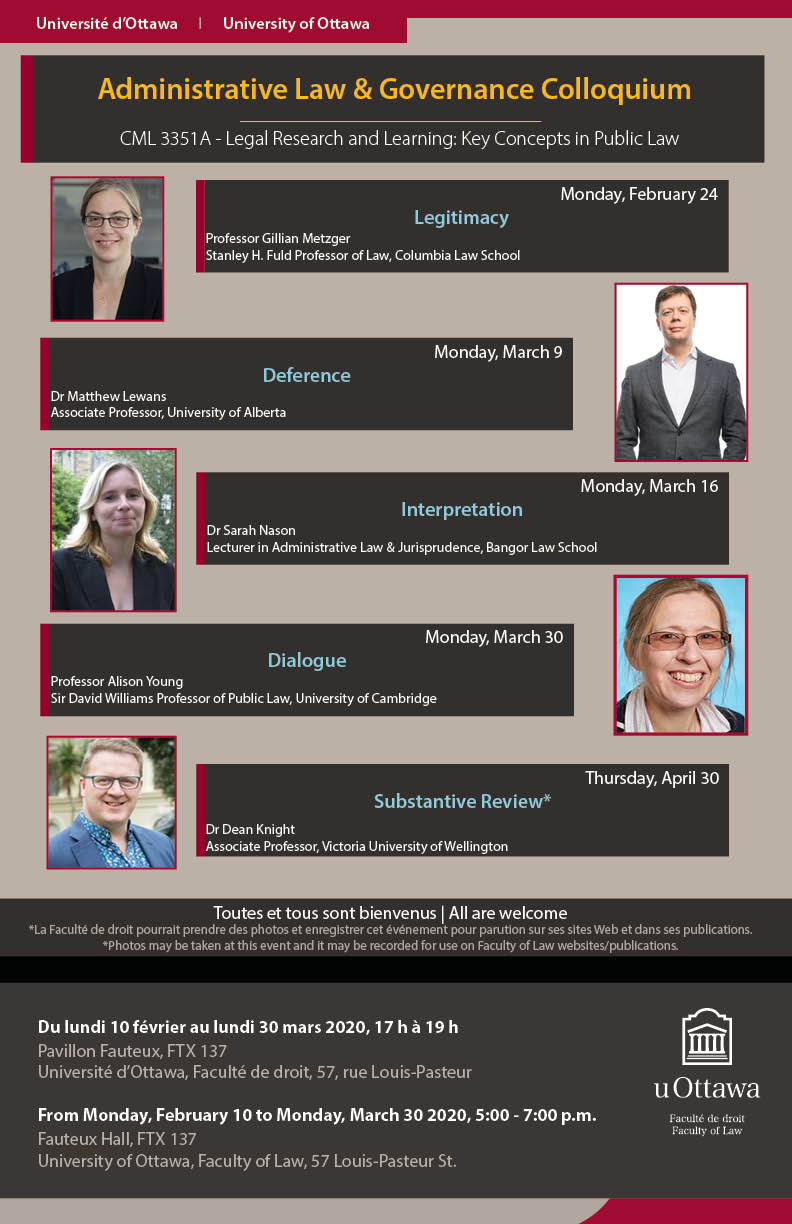Administrative Law & Governance Colloquium 2020: Sarah Nason, Monday, March 16, 5pm WEBCAST

On Monday, the Administrative Law & Governance Colloquium features Sarah Nason (Bangor Law School), on the topic of “Interpretation”. Due to her institution’s Coronavirus policy, Dr Nason is unable to travel to Ottawa as planned. But she will be presenting via videoconference. And every cloud has a silver lining: this means that Dr Nason’s presentation is open to all. Just click here to join the webinar, which should be live a little bit before 5pm on Monday, March 16.
Dr Nason will mainly be discussing her monograph Reconstructing Judicial Review (Hart Publishing, 2016):
This book offers a new interpretation of judicial review in England and Wales as being concerned with the advancement of justice and good governance, as opposed to being concerned primarily with ultra vires or common law constitutionalism. It is developed both from examining the functions and values that ought to be served by judicial review, and from analysis of empirical ‘social’ facts about judicial review primarily as experienced in the Administrative Court. Based on ground-up case law analysis it constructs a new taxonomy on the grounds of judicial review: mistake, procedural impropriety, ordinary common law statutory interpretation, discretionary impropriety, relevant/irrelevant considerations, breach of an ECHR protected right or equality duty, and constitutional allocation of powers, constitutional rights, or other complex constitutional principles. It explains each of these grounds, what academic and judicial support there might be for them outside case law analysis, and their similarities and differences when viewed against popular existing taxonomies. It concludes that Administrative Court judges are engaged in ordinary common law statutory interpretation in approximately half of all cases, and that where discretionary judgement is involved on the part of the initial decision-maker, judges do indeed consider their task to be one of determining whether the challenged decision was justified by reasoning of adequate quality. It finds that judges apply ordinary common law principles of statutory interpretation with historical pedigrees, including assessing the initial decision-maker’s reasoning with reference to statutory purpose, and sifting relevant from irrelevant considerations, including moral considerations. The result is a ground-breaking reassessment of the grounds of judicial review in England and Wales and the practice of the Administrative Court.
The webinar will be available at this link.
Here is Dr Nason’s biography:
Dr. Nason is a lecturer at Bangor Law School in the United Kingdom. Her research interests include public law, administrative justice, devolution, comparative public law and jurisprudence (legal philosophy).
Dr. Nason’s educational background includes a BA from the University of Cambridge and a PhD Laws from University College London. Her recent publications have appeared in journals such as: Public Law, Australian Journal of Administrative Law, and European Public Law.
Dr. Nason is a member of the editorial board of the journal Public Law, an executive committee member of Public Law Wales and a member of the UK Administrative Justice Council Academic Panel. Dr. Nason is an Academic Fellow for the National Assembly for Wales.
And here is some suggested reading on the general topic:
Ronald Dworkin, Law’s Empire (Belknap Press, 1986), chapter 6
This content has been updated on March 15, 2020 at 17:38.